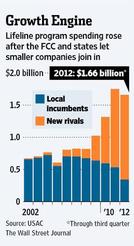
The federal program is question is the LIfeline program which subsidizes wireless phone service to ensure poor people have the ability to call their families, jobs or for emergency help.
Until 2012, the FCC allowed consumers to self-certify their eligibility, and in many states documentation was not required. Very poor idea.
Not surprisingly, A Wall Street Journal review of FCC data showed >40% of the 6 million subscribers at 5 of the program's top carriers were either ineligible or failed to show that they qualified.
Investigators have discovered questionable tactics by companies participating in the program. For example:
- Signing up customers in hospital rooms
- Enrolling subscribers by mailing them unsolicited phones
- Signing up ineligible customers
- Signing up the same customers multiple times
- Signing up children
- Applications lacking required signatures
Clues something was amiss:
- In 2012, the government spent US$2.2 billion on the Lifeline program, up from $819 million 4 years earlier, as dozens of small companies were authorized to start providing the service.
- Oklahoma experienced subscribers growing so fast the state is likely to exhaust the supply of phone numbers in the 405 area code sooner than expected.
- Carriers signing up so many subscribers, more than mathematically possible.
- A spike in Lifeline payments to specific carriers. One in Wisconsin went from receiving 1% of Lifeline reimbursements in the state in Q2 2010 to 33% of disbursements in Q2 2011.
Detecting and monitoring such waste and fraud becomes expensive and time consuming - a further waste of taxpayer money and government resouces. Which raises the question: Should governments even get involved in this in the first place or are taxpayers and intended beneficiaries better off by an alternative arrangement?
Source: "Abuse Worries Grow on Phone Aid for Poor", Wall Street Journal, February 18, 2013.
http://online.wsj.com/article/SB10001424127887323764804578312574084396946.html?mod=WSJ_hp_LEFTWhatsNewsCollection
CKB Solutions is all about real solutions for the real world. To learn how we can help your business, contact Greg Kovacic in Hong Kong.


 RSS Feed
RSS Feed
